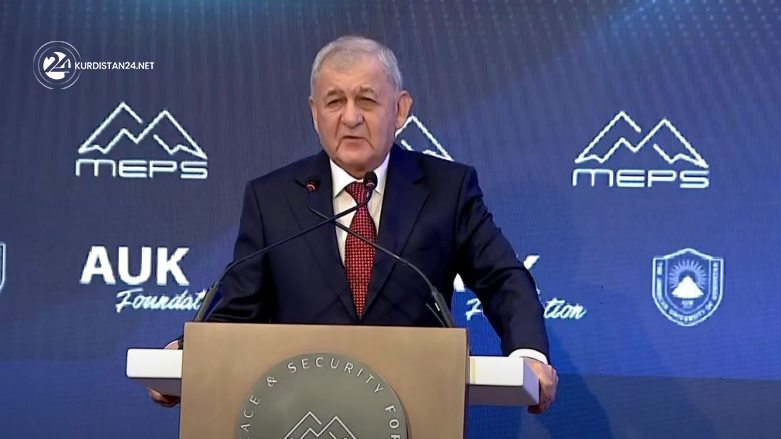Iraq intends to establish high council to manage water resources, policy

ERBIL (Kurdistan 24) – Iraqi President Latif Rasheed on Thursday announced that his office is working to establish a top council to be in charge of water policy and the country’s fair share from the twin rivers flowing into Iraq.
President Rasheed’s remarks came during a speech he delivered on the third day of the Middle East Peace and Security Forum 2022 held at the American University of Kurdistan (AUK) in the Kurdistan Region’s Duhok province.
The Iraqi official highlighted water scarcity as one of the pressing challenges facing the country, exacerbated by drought and the “behavior of neighboring countries”.
The president’s office is currently working on the water dossier, according to Rasheed, saying he would work to establish a top water council to manage the resource and implement the country’s policy in this regard.
The Kurdistan Regional Government (KRG) and its federal counterpart will also be part of the council, he added.
Baghdad has held numerous rounds of talks so far with both Ankara and Tehran on the water issue in order to secure Iraq’s “fair share” from the twin Euphrates and Tigris rivers, according to Rasheed.
Agricultural lands and the historic marshes in Iraq have largely been affected by the depleted source of water, causing migration of the rural population and instability in food security.
Iraq should also manage water internally by applying technological developments for irrigation and drinking water, Rasheed said.
During his participation at the climate summit of COP27 in Egypt recently, President Rasheed raised similar environmental challenges that his country is facing, calling for greater cooperation between the countries – Syria, Turkey, and Iran – that depend on Euphrates and Tigris rivers.
Iraq is the fifth most vulnerable country in the world to the adverse effects of climate change, per a United Nations assessment.
The third annual conference officially began on Tuesday on the AUK campus, where parallel workshops were held.
On the second day of the event, numerous topics related to Middle Eastern politics, economics as well as climate change challenges were discussed along with the West's position in the region's dynamics.
A number of top Iraqi and Kurdistan Region officials are set to take part in the last day of the conference, including Prime Minister Masrour Barzani, President Latif Rasheed as well as Speaker Mohamed Al-Halboosi.
Read More: AUK, AUK Foundation host 3rd Middle East Peace and Security Forum
